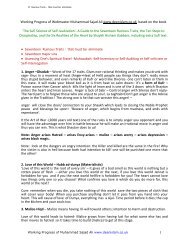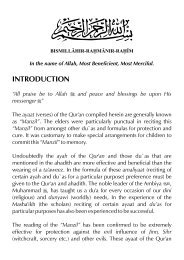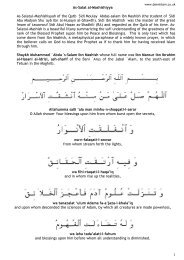Sufi Introduction to the 99 Names of Allah and sufi ... - Deen islam
Sufi Introduction to the 99 Names of Allah and sufi ... - Deen islam
Sufi Introduction to the 99 Names of Allah and sufi ... - Deen islam
Create successful ePaper yourself
Turn your PDF publications into a flip-book with our unique Google optimized e-Paper software.
Collected by Muhammad Sajad Ali - webmaster – www.deen<strong>islam</strong>.co.uk - 10 th December 2009<br />
6<br />
Cited in Abû Nasr al-Sarrâj, Kitâb al-lumâ', ed. R.A. Nicholson, 1914, p.36 [Arabic text].<br />
7<br />
This Hint draws on Hadrat Junayd's saying on <strong>the</strong> relation <strong>of</strong> <strong>the</strong> knowledge <strong>of</strong> <strong>Allah</strong> <strong>to</strong> <strong>the</strong> Knower <strong>of</strong> <strong>Allah</strong> –<br />
"The colour <strong>of</strong> <strong>the</strong> water is <strong>the</strong> colour <strong>of</strong> <strong>the</strong> vessel." (Cited in 'Abdul-Karîm Qushayrî, Risâlah, "Ma'rifah.")<br />
You will see your Lord, on <strong>the</strong> Resurrection Day, as you see <strong>the</strong> moon on <strong>the</strong> night when it is full, or as you<br />
see <strong>the</strong> sun at noon in a cloudless sky, <strong>and</strong> you will not be harmed by your vision <strong>of</strong> Him.<br />
And also what <strong>Allah</strong> Most High has said about <strong>the</strong> denizens <strong>of</strong> Hell (Tatfîf 15):<br />
That day <strong>the</strong>y will be veiled from <strong>the</strong>ir Lord.<br />
8<br />
Now in <strong>the</strong> Arabic language <strong>the</strong> verb nazara, <strong>to</strong> look, when accompanied by <strong>the</strong> preposition ilâ can only mean<br />
<strong>to</strong> look upon, with <strong>the</strong> eyes. It is when followed by fi that it means <strong>to</strong> look in<strong>to</strong>, mentally <strong>and</strong> intellectually,<br />
<strong>and</strong> when followed by lî that it means <strong>to</strong> look after, with compassion; o<strong>the</strong>r prepositions lead it <strong>to</strong> signify<br />
encounter, struggle, or delay. Also, <strong>the</strong> eyes are one <strong>of</strong> <strong>the</strong> attributes <strong>of</strong> <strong>the</strong> face, while <strong>the</strong> intellect is not.<br />
Consequently <strong>the</strong> looking mentioned in this verse must be <strong>the</strong> vision <strong>of</strong> <strong>the</strong> eyes.<br />
<strong>Allah</strong>'s saying (A'raf 143):<br />
You cannot see Me.<br />
<strong>to</strong> Moses (peace be upon him) was a decision relevant <strong>to</strong> a state that may be known from Moses's request [<strong>to</strong><br />
see his Lord]. We shall not attempt <strong>to</strong> discuss that here. Yet <strong>Allah</strong> did make [His vision] lawful <strong>to</strong> <strong>the</strong><br />
mountain, which shattered <strong>to</strong> a<strong>to</strong>ms, while Moses fell in<strong>to</strong> a 9 swoon.<br />
Now, perception does not faint. A particular constitution is not one <strong>of</strong> its requirements (nor was it a<br />
requirement here) – its only requirement is something <strong>to</strong> subsist in, because it is an intangible. Fainting,<br />
though, exists by virtue <strong>of</strong> a heavy <strong>and</strong> dense constitution.<br />
When Moses recovered, he glorified <strong>Allah</strong>. There would be no point <strong>to</strong> his giving praise when he arose from<br />
this state unless he had been granted some sort <strong>of</strong> contemplation. Next, realization led him <strong>to</strong> repentance<br />
for <strong>the</strong> conditions imposed by his constitution. Then he avowed that be was (A'raf 143):<br />
<strong>the</strong> first <strong>of</strong> those who believe<br />
in what he had seen in that swoon, for faith does not take shape without vision, in whatever realm it may<br />
be.<br />
10<br />
8<br />
Bukharî, Bad' al-khalq 7, Anbiya' 1; Muslim, Imân 380-383, Jannah 14-17; Tirmidhi Qiyâmah 60, Jannah 7;<br />
Ibn Mâjah, Zuhd 39; Darîmî, Riqâq 12; Ibn Hanbal, II:230, 232, 254, 257, 316, 359, 473, 502, 504, 507; III:16;<br />
VI:355.<br />
9<br />
The whole episode is <strong>to</strong>ld in A'raf 143: And when Moses came at Our appointed time <strong>and</strong> His Lord spoke <strong>to</strong><br />
him, he said: "My Lord, make me see, that 1 may look upon You." He said: "You cannot see Me, but look at<br />
<strong>the</strong> mountain: if it stays firmly in its place, <strong>the</strong>n you will see Me." So when His Lord manifested Himself <strong>to</strong><br />
<strong>the</strong> mountain, it crumbled, <strong>and</strong> Moses fell down in a swoon. Then when he awakened he said, "Glory <strong>to</strong> You, I<br />
have returned <strong>to</strong> You, <strong>and</strong> I am <strong>the</strong> first <strong>of</strong> those who believe."<br />
10<br />
In Chapter 367 <strong>of</strong> <strong>the</strong> Futûhât (translated by James Morris, Journal <strong>of</strong> <strong>the</strong> American Oriental Society,<br />
108:1) Hadrat Ibn 'Arabi reports a visionary conversation with Moses about this event. The Shaykh asks Moses<br />
(peace be upon him):<br />
155







